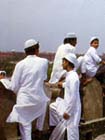Equality of opportunity has largely been a mirage for the Muslims
 The government machinery has been either hostile or lackadaisical in responding to individual and collective efforts to redress
the inequities and imbalances in private and public sectors. In
May 1983 Indira Gandhi emphasised her commitment to the secular
ideal. The India of our dreams, she wrote, can survive only if
Muslims and other minorities can live in absolute safety and confidence.
The government machinery has been either hostile or lackadaisical in responding to individual and collective efforts to redress
the inequities and imbalances in private and public sectors. In
May 1983 Indira Gandhi emphasised her commitment to the secular
ideal. The India of our dreams, she wrote, can survive only if
Muslims and other minorities can live in absolute safety and confidence.
Acting at the behest of some Muslim members of Parliament and
the Jamiyat-al-ulama, she issued guidelines on better job opportunities
for Muslims, but the central and state governments ignored her
directive. Individual appeals to industrialists to recruit Muslim
graduates fell on deaf ears. Such was Badruddin Tyabji's experience
as Aligarh University's vice-chancellor. He discovered, as have
others since, the small proportion of Muslims in large-scale industry
or business.
Not a single Muslim figured among the 50 industrial
houses up till 1985. Muslim industrialists owned only 4 units
in a group of 2,832 industrial enterprises, each with sales of
Rs 50 million and above. In the smaller industrial sector, they
owned about 14,000 units out of a total of 600,000 of which 2,000
belonged to the 'small' category with a limited capital outlay.
In general, Muslim access to government-sponsored welfare projects
was limited. For example, up till 1985 Muslims in the lower and
middle income groups received 2.86 per cent of houses allotted
by the state governments and only 6.9 per cent of licenses for
'Fair Price' shops. Muslim artisans received only 9.15 per cent
of the benefits extended by the Khadi and Village Industries Commission. Only 301 out of the 10,450 units under the KVIC programme
belonged to Muslims, and only 45 million out of 5,846 artisans
who gained subsidies for purchasing tools and equipments were
Muslims; as were only 99 out of 74,000 who secured other financial
benefits.
Muslims accounted for 3 per cent of the sums advanced
and 3.4 per cent of the recipients of loans for small industry
and agriculture in the range of Rs 50,000 to Rs 100,000, and less
than 6 per cent in the Rs 100,000 to Rs 200,000 category. They accounted
for 3 per cent of recipients and 1 per cent of sums advanced in
the higher bracket of Rs 200,000 to Rs 1 million. The GSC thought that the
poorer Muslims should have benefited most from the differential
rate of interest and composite loan schemes, which were meant for
lower income groups, but this did not happen.
Many writers emphatically believe that discriminatory practices
contributed to Muslims being the hewers of wood and drawers of
water. 'Equality of opportunity guaranteed by the Constitution,'
Shahabuddin commented, 'has largely proved to be a mirage in practice.
Muslim India suffers from discrimination in access to public employment,
to higher education or to career promotion opportunities, to public
credit, to industrial and trade licensing.
 Maulana Wahiduddin Khan, a Delhi-based scholar, blames the Muslims's
'own backwardness, which they misguidedly wish to blame on others.'
Most Muslim scholars and social and political activists have no
sympathy for this view or, for that matter, for the argument that
Muslim backwardness is linked to the nature of economic growth,
the uneven distribution of material wealth and the slow and tardy
progress of the economy as a whole.
Maulana Wahiduddin Khan, a Delhi-based scholar, blames the Muslims's
'own backwardness, which they misguidedly wish to blame on others.'
Most Muslim scholars and social and political activists have no
sympathy for this view or, for that matter, for the argument that
Muslim backwardness is linked to the nature of economic growth,
the uneven distribution of material wealth and the slow and tardy
progress of the economy as a whole.
They likewise do not subscribe
to the view that their problems could be solved in the same way
as the chronic poverty of the other rural and urban poor. They
insist that opportunities for economic advance are specifically
blocked for Muslims because of official neglect and discrimination.
Hence the clamour for a larger share of the national wealth.
'We must demand our due from the system' wrote Shahabuddin at the
beginning of 1984. 'We do not cry for favours or preferences but
we assert our right to equality.' The All-India Milli Council,
formed in 1992, has undertaken to draw attention to the continually
declining condition of Muslims and their unemployment in various
parts of the country.
Excerpted from Legacy of a Divided Nation, by Mushirul Hasan, 1997, Rs 495, with the publisher's permission.
|

